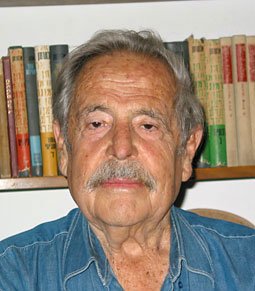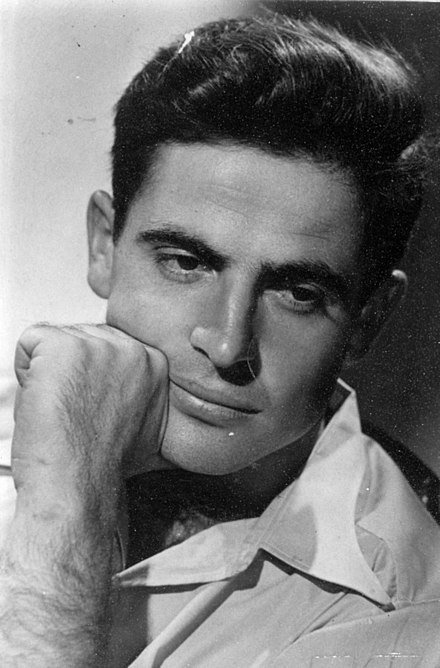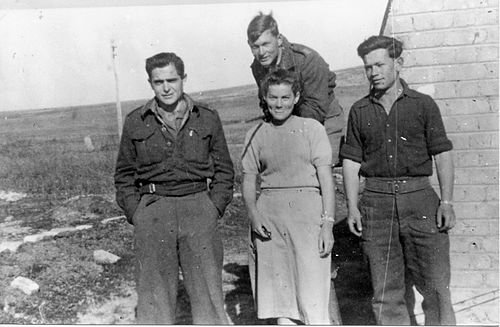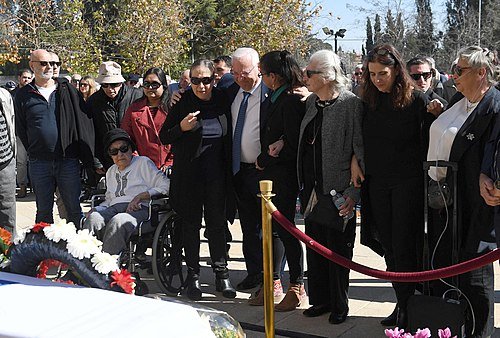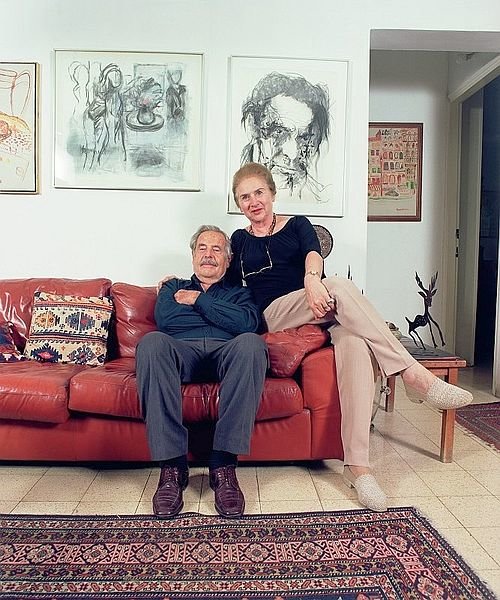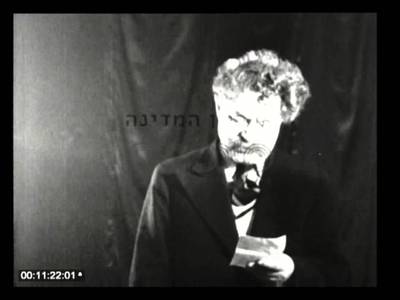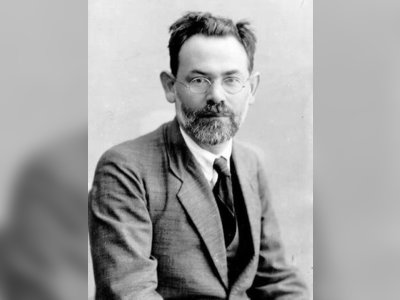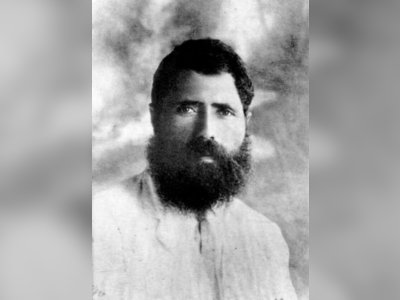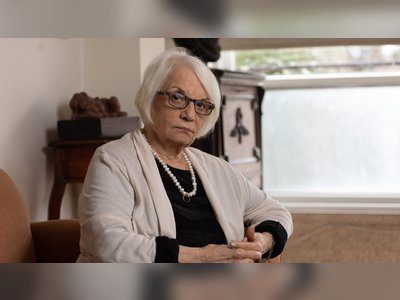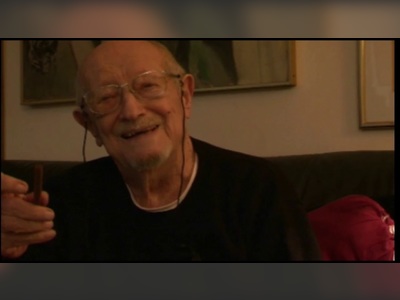מורשת גדולי האומה
בזכותם קיים
beta
Chaim Gouri: A Life of Poetry, Courage, and Legacy
Chaim Gouri (October 9, 1923 – January 31, 2018) was an Israeli poet, writer, lyricist, journalist, and filmmaker. He was not only a celebrated literary figure but also a courageous soldier, having served in the Palmach during Israel's War of Independence. Gouri's work has left an indelible mark on Israeli culture and literature, earning him prestigious awards and recognition throughout his lifetime.
Born as Chaim Gurfinkel in Tel Aviv, Gouri's early education took place at the Workers' Children's School in Tel Aviv, the children's society on Kibbutz Beit Alfa, and the regional school in Giv'at HaShelosha. Later, he attended the agricultural high school in Merhavia, near Mount Tabor. From a young age, Gouri was immersed in the Zionist youth movement's activities.
In 1941, Gouri joined the Palmach, the elite strike force of the Haganah, the precursor to the Israel Defense Forces (IDF). He subsequently completed courses in command and staff training, becoming an officer in the Palmach's first battalion.
In 1946, he participated in the sabotage of radar stations in St. Marc, France. In 1947, Gouri was sent on a mission to work with Holocaust survivors in Hungarian displaced persons camps, helping to organize their immigration to Israel. From there, he moved to Czechoslovakia and served as the commander of the first paratrooper course of the IDF, conducted within the Czech army.
During the War of Independence, Gouri fought as a deputy company commander in the Seventh Brigade's Negev Battalion. In the final operation of the war, Operation Uvda, he served as the deputy to Abraham Adan (Baron), the commander of the Givati Brigade's Combat Support Unit.
During the Six-Day War, Gouri participated in the battle for Jerusalem as a company commander.
In 1968, he transitioned to an educational role, and during the Yom Kippur War, he served as an educational officer in the Sinai Peninsula.
Gouri authored his first book of poetry, "Pirhei Esh" (Flowers of Fire), in 1949, which received acclaim both from readers and the literary establishment, establishing him as one of the prominent voices of the War of Independence generation.
From 1950 to 1952, Gouri studied Hebrew literature, philosophy, and French culture at the Hebrew University of Jerusalem. In 1953, he continued his studies in France.
Starting in 1954, Gouri began writing a column in the newspaper "LaMerhav," and later in "Davar," alongside his literary endeavors.
Throughout his career, Chaim Gouri published more than 12 volumes of poetry, 10 works of prose, newspaper articles, and testimonies. He also translated French poetry, prose, and plays.
He received an honorary doctorate from Ben-Gurion University and the Hebrew University in Jerusalem, was named an honorary citizen of Tel Aviv, and was honored with the title "Yakir Yerushalayim" (Honorary Citizen of Jerusalem).
Gouri continued his literary and journalistic activities, with his articles appearing in "Haaretz" and other newspapers. His book "Ivle" was published in 2009, and Professor Nissim Calderon of Ben-Gurion University described it as "Chaim Gouri wrote a profound and unforgettable book of poems."
In October 2007, he donated his extensive archive to the National and University Library.
In 2015, Chaim Gouri was awarded the Zionism Prize for his book "Even Though I Wanted More," but he declined the prize, stating, "This is a prize for Zionism. I have been a Zionist since the day I was born, and I will die a Zionist, and my entire life I fought for Zionism. However, I do not believe this book is worthy of this prize. The book goes beyond this framework, but I appreciate the judges who chose it, wanting to do something good and honor me, and I asked them to give it to young creators at the beginning of their careers."
Chaim Gouri's oeuvre spans several decades and covers a wide range of topics, including love, war, time, and aging. His work includes both personal poems and those that touch on social and national themes.
In his book "Between Vows and Pledges: Poetics, Semiotics, and Rhetoric in the Works of Chaim Gouri," Professor Reuven Tsur of the University of Haifa wrote about Gouri's literary contributions: "His work is part of the great tradition of modern Hebrew literature, which took upon itself the role of 'the watchman of the House of Israel,' rooted in the prophetic tradition of the prophet Ezekiel, with its origin in the prophetic tradition of the prophet Isaiah. It continued in the satires of Yitzhak Erter (mid-nineteenth century), and developed in the poetry of Bialik, Greenberg, Shlonsky, and many others... Key themes that have preoccupied him since the beginning of his appearance on the Hebrew poetry stage include the wars of existence of the Jewish people, the Holocaust, Jewish-Israeli identity, his position as a 'watchman of the House of Israel,' and a 'secular sage.'"
Some of Gouri's poems have become inseparable from Israeli ethos. One of his most famous poems, "Hineh Matzilei Gufoteinu" ("Here Lie Our Bodies"), written during the War of Independence, serves as a poignant reminder of the sacrifice made by his comrades who fell while defending Gush Etzion. The poem emphasizes the importance of memory and was originally written in the plural form, symbolizing the collective memory of the fallen. Gouri penned this poem while he was still in Hungary and later included it in his first book, "Pirhei Esh." Several other well-known songs and poems by Gouri from that period also became emblematic of the nation's struggle.
Gouri's work bears a strong influence of the Holocaust, despite not having experienced it firsthand. He absorbed this influence during his time in displaced persons camps, where he had extensive conversations with Holocaust survivors. Their harrowing accounts and stories of the Holocaust deeply affected him, as reflected in his later works.
One event that profoundly impacted Gouri was the Eichmann trial. In 1961, as a journalist for the "LaMerhav" newspaper, he covered the trial, and his articles included the horrifying testimonies of Holocaust survivors. These articles were later compiled into the book "Mul Ta HaZekhukhit" ("Facing the Glass Booth").
In 1972, friends from Kibbutz Lochamei HaGeta'ot invited Gouri to create a film for the Ghetto Fighters' House museum. Despite having no prior experience in filmmaking, Gouri accepted the challenge. Over the course of 13 years, with the assistance of Jacques Arlich and David Bergman, he produced a documentary trilogy on the Holocaust. The first film, "The 81st Blow," released in 1974, traced the rise of the Nazis to power and ended with the extermination of the Jews. The title was inspired by the testimony of Holocaust survivor Michael Goldman-Gilad, who survived 80 blows by a Nazi soldier. The trilogy also included "Flames in the Ashes" and "The Last Sea."
Chaim Gouri's contribution to Israeli culture and literature extends far beyond his written works. His poems and writings have been set to music by some of Israel's most renowned composers, including Sasha Argov, Moshe Wilensky, and Nurit Hirsh. Many of these songs have become classics, beloved by generations of Israelis.
In addition to his literary and journalistic work, Gouri's legacy includes his tireless efforts to preserve the memory of the Holocaust. He believed that the Holocaust must be remembered not only as a historical event but also as a lesson for humanity. Through his poems, articles, and documentary films, he sought to ensure that the voices of Holocaust survivors would continue to be heard, and that the world would never forget the atrocities of the past.
Chaim Gouri passed away on January 31, 2018, at the age of 94. His death marked the end of an era in Israeli literature and culture, but his words and legacy continue to resonate with readers and audiences around the world. His commitment to truth, memory, and the enduring spirit of the Jewish people is a testament to the power of literature and art to shape the world and inspire generations to come.
In 1941, Gouri joined the Palmach, the elite strike force of the Haganah, the precursor to the Israel Defense Forces (IDF). He subsequently completed courses in command and staff training, becoming an officer in the Palmach's first battalion.
In 1946, he participated in the sabotage of radar stations in St. Marc, France. In 1947, Gouri was sent on a mission to work with Holocaust survivors in Hungarian displaced persons camps, helping to organize their immigration to Israel. From there, he moved to Czechoslovakia and served as the commander of the first paratrooper course of the IDF, conducted within the Czech army.
During the War of Independence, Gouri fought as a deputy company commander in the Seventh Brigade's Negev Battalion. In the final operation of the war, Operation Uvda, he served as the deputy to Abraham Adan (Baron), the commander of the Givati Brigade's Combat Support Unit.
During the Six-Day War, Gouri participated in the battle for Jerusalem as a company commander.
In 1968, he transitioned to an educational role, and during the Yom Kippur War, he served as an educational officer in the Sinai Peninsula.
Gouri authored his first book of poetry, "Pirhei Esh" (Flowers of Fire), in 1949, which received acclaim both from readers and the literary establishment, establishing him as one of the prominent voices of the War of Independence generation.
From 1950 to 1952, Gouri studied Hebrew literature, philosophy, and French culture at the Hebrew University of Jerusalem. In 1953, he continued his studies in France.
Starting in 1954, Gouri began writing a column in the newspaper "LaMerhav," and later in "Davar," alongside his literary endeavors.
Throughout his career, Chaim Gouri published more than 12 volumes of poetry, 10 works of prose, newspaper articles, and testimonies. He also translated French poetry, prose, and plays.
He received an honorary doctorate from Ben-Gurion University and the Hebrew University in Jerusalem, was named an honorary citizen of Tel Aviv, and was honored with the title "Yakir Yerushalayim" (Honorary Citizen of Jerusalem).
Gouri continued his literary and journalistic activities, with his articles appearing in "Haaretz" and other newspapers. His book "Ivle" was published in 2009, and Professor Nissim Calderon of Ben-Gurion University described it as "Chaim Gouri wrote a profound and unforgettable book of poems."
In October 2007, he donated his extensive archive to the National and University Library.
In 2015, Chaim Gouri was awarded the Zionism Prize for his book "Even Though I Wanted More," but he declined the prize, stating, "This is a prize for Zionism. I have been a Zionist since the day I was born, and I will die a Zionist, and my entire life I fought for Zionism. However, I do not believe this book is worthy of this prize. The book goes beyond this framework, but I appreciate the judges who chose it, wanting to do something good and honor me, and I asked them to give it to young creators at the beginning of their careers."
Chaim Gouri's oeuvre spans several decades and covers a wide range of topics, including love, war, time, and aging. His work includes both personal poems and those that touch on social and national themes.
In his book "Between Vows and Pledges: Poetics, Semiotics, and Rhetoric in the Works of Chaim Gouri," Professor Reuven Tsur of the University of Haifa wrote about Gouri's literary contributions: "His work is part of the great tradition of modern Hebrew literature, which took upon itself the role of 'the watchman of the House of Israel,' rooted in the prophetic tradition of the prophet Ezekiel, with its origin in the prophetic tradition of the prophet Isaiah. It continued in the satires of Yitzhak Erter (mid-nineteenth century), and developed in the poetry of Bialik, Greenberg, Shlonsky, and many others... Key themes that have preoccupied him since the beginning of his appearance on the Hebrew poetry stage include the wars of existence of the Jewish people, the Holocaust, Jewish-Israeli identity, his position as a 'watchman of the House of Israel,' and a 'secular sage.'"
Some of Gouri's poems have become inseparable from Israeli ethos. One of his most famous poems, "Hineh Matzilei Gufoteinu" ("Here Lie Our Bodies"), written during the War of Independence, serves as a poignant reminder of the sacrifice made by his comrades who fell while defending Gush Etzion. The poem emphasizes the importance of memory and was originally written in the plural form, symbolizing the collective memory of the fallen. Gouri penned this poem while he was still in Hungary and later included it in his first book, "Pirhei Esh." Several other well-known songs and poems by Gouri from that period also became emblematic of the nation's struggle.
Gouri's work bears a strong influence of the Holocaust, despite not having experienced it firsthand. He absorbed this influence during his time in displaced persons camps, where he had extensive conversations with Holocaust survivors. Their harrowing accounts and stories of the Holocaust deeply affected him, as reflected in his later works.
One event that profoundly impacted Gouri was the Eichmann trial. In 1961, as a journalist for the "LaMerhav" newspaper, he covered the trial, and his articles included the horrifying testimonies of Holocaust survivors. These articles were later compiled into the book "Mul Ta HaZekhukhit" ("Facing the Glass Booth").
In 1972, friends from Kibbutz Lochamei HaGeta'ot invited Gouri to create a film for the Ghetto Fighters' House museum. Despite having no prior experience in filmmaking, Gouri accepted the challenge. Over the course of 13 years, with the assistance of Jacques Arlich and David Bergman, he produced a documentary trilogy on the Holocaust. The first film, "The 81st Blow," released in 1974, traced the rise of the Nazis to power and ended with the extermination of the Jews. The title was inspired by the testimony of Holocaust survivor Michael Goldman-Gilad, who survived 80 blows by a Nazi soldier. The trilogy also included "Flames in the Ashes" and "The Last Sea."
Chaim Gouri's contribution to Israeli culture and literature extends far beyond his written works. His poems and writings have been set to music by some of Israel's most renowned composers, including Sasha Argov, Moshe Wilensky, and Nurit Hirsh. Many of these songs have become classics, beloved by generations of Israelis.
In addition to his literary and journalistic work, Gouri's legacy includes his tireless efforts to preserve the memory of the Holocaust. He believed that the Holocaust must be remembered not only as a historical event but also as a lesson for humanity. Through his poems, articles, and documentary films, he sought to ensure that the voices of Holocaust survivors would continue to be heard, and that the world would never forget the atrocities of the past.
Chaim Gouri passed away on January 31, 2018, at the age of 94. His death marked the end of an era in Israeli literature and culture, but his words and legacy continue to resonate with readers and audiences around the world. His commitment to truth, memory, and the enduring spirit of the Jewish people is a testament to the power of literature and art to shape the world and inspire generations to come.
- חיים גוריhe.wikipedia.org
